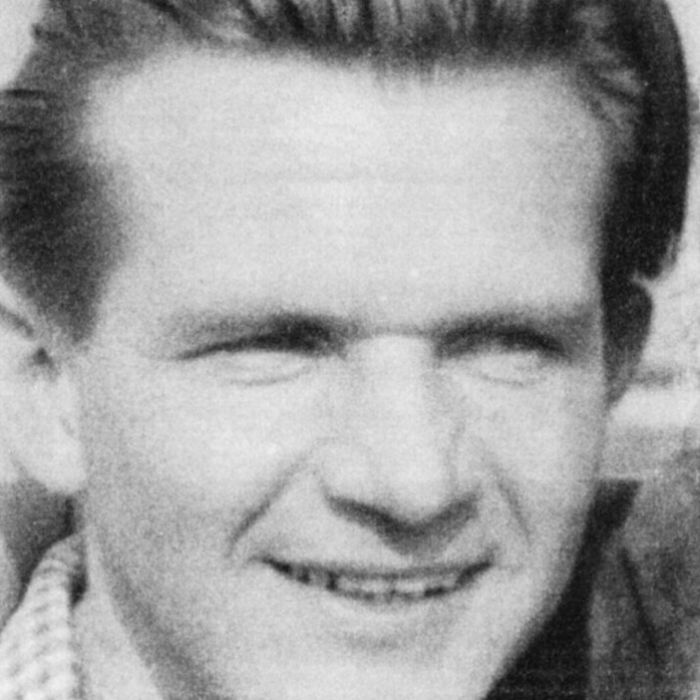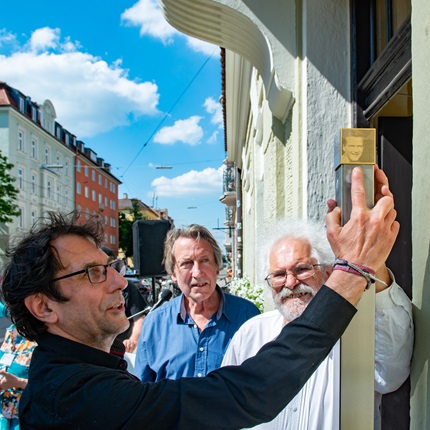Franz Scheider was born to a working-class family in Munich on December 13, 1913 and grew up in the house at Belgradstrasse 16 in Schwabing. He initially apprenticed as a machine fitter, then studied mechanical engineering. He was unemployed from 1931 onwards and continued living with his parents. He spent his free time in the socially oriented Naturfreundejugend (Young Naturefriends) and the Freie Turnerschaft (Free Gymnastic Association). He had already been active in the metalworkers’ union during his apprenticeship. At the age of sixteen he joined the Kommunistischer Jugendverband KJVD (Young Communist League of Germany) and, not long afterwards, the Kampfgemeinschaft für Rote Sport-Einheit (Red Sports Unit Action Group), where he was on the board of the Southern German chapter in 1932.
Once they were in power, the Nazis began arresting political opponents. Franz Scheider fled to the mountains with friends and later continued on to Austria and Czechoslovakia. He returned to Munich in the summer of 1933 and joined a resistance group. With support from his brother Georg, he helped produce and distribute illegal leaflets. In July 1933 he was able to evade arrest by fleeing from his parents’ apartment. He initially stayed in a tent to the south of Munich. On the evening of August 18, 1933 the police captured him and other Communists at an illegal printing shop on Rottenbucherstrasse in Obersendling, where they had just finished printing 1,000 copies of the German Communist Party newspaper Neue Zeitung. Franz Scheider was taken to the police headquarters prison, interrogated and then committed to the Dachau concentration camp. On May 15, 1934, the regional appeals court of Munich sentenced Franz and seven other defendants to two years and three months confinement for “preparation for high treason.” He served his sentence in Amberg and Straubing. After his release in May 1936 he worked as a heating installer and in December 1939 he married the dressmaker Dorothea Ettmeier. The two knew each other from the workers’ sports club and the Young Communist League.
As the war continued, more and more soldiers were needed. Following an amnesty by Hitler, opponents of the Nazi regime who had been condemned as “unworthy to bear arms” were called up for war service—among them Franz Scheider. On December 1, 1942, shortly after the birth of his daughter Christine, he was committed to the infamous penal military unit known as the Bewährungseinheit 999 and assigned to a fortification infantry battalion in the Peloponnese in Wehrmacht-occupied Greece. It is not known whether his unit was ordered to combat partisans and carry out “retaliation measures” against the civilian population. Through contact with partisans, Franz and several close confidants—most of them likewise Nazi opponents—came into possession of a leaflet. The text called on German soldiers to disarm their officers and cease combat operations when attacked by British troops. Franz and his comrades communicated secretly about the leaflet and were informed on. On June 4, 1944, a field court martial sentenced Franz and five other soldiers to death, some for “war treason in combination with subversion of military power” and the others for failing to report these offenses. Franz was executed on June 9, 1944 near Amaliada. He was thirty years old. When the court informed his widow of his execution, it explicitly forbade her to give public notice of his death. Franz Scheider was laid to rest in the town cemetery of Amaliada. His daughter Christine died in 1943. Dorothea Scheider remarried after the war. Her family preserved the memory of Franz Scheider. (text Friedbert Mühldorfer, editor C. Fritsche, translation)





